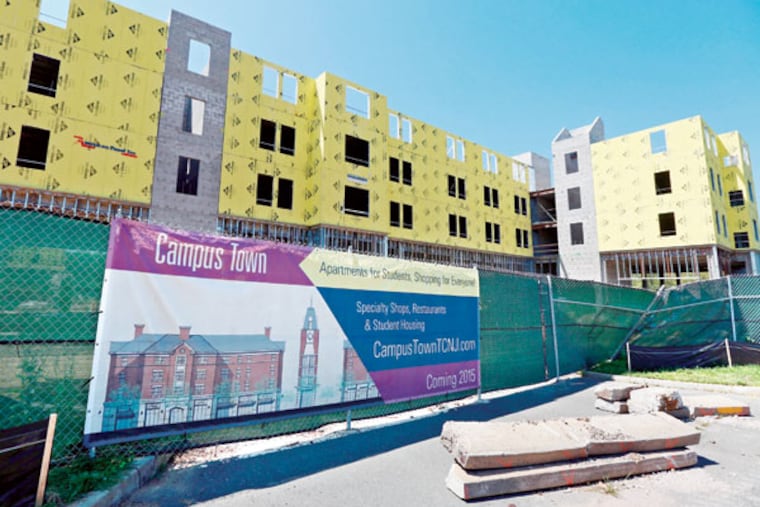College of New Jersey to build even more housing
The College of New Jersey knew students wanted to live on campus, but it didn't realize just how big its housing gap was.

The College of New Jersey knew students wanted to live on campus, but it didn't realize just how big its housing gap was.
When the Monmouth County-based developer PRC Group began planning a "Campus Town" project mixing housing, shops, and restaurants on 12 acres of college-owned property adjacent to the main campus in Ewing, the college negotiated to build enough space for 446 students.
As students came back to school last semester, the first 300 beds were leased in less than three weeks. Within three months of opening the applications, all 446 spots were taken. A waiting list had more than 100 students.
On Tuesday, PRC Group announced that it would build more housing to meet that demand. Two new buildings will fit 166 students, increasing the Campus Town housing 37 percent from the original plan.
"We were kind of thrilled and surprised," said Curt Heuring, vice president of administration. "Clearly, there is student demand there to live on or near campus, and some high-end mixed-use facilities."
The initial Campus Town buildings are scheduled to open this fall for the next academic year. The two new buildings will take about a year to develop and will open for the 2016-17 school year, said Greg Lentine, who directs the project for PRC.
As with the originally planned Campus Town housing, most of the new units will be four-bedroom apartments, with some one- and two-bedroom units available. The units opening this fall are renting for $5,462 per semester, Lentine said.
The buildings will cost about $15 million each, bringing the Campus Town project to a total of about $121 million, he said.
The developer also will redesign and rebuild the college's entrance along its main drive, Pennington Road, and fund an endowment to maintain it, Heuring said.
About 3,800 of the college's 6,500 undergraduate students live in campus housing. Many of the remaining students find housing in surrounding neighborhoods. Students make up more than 15 percent of Ewing Township's population during the school year.
Campus Town is operated privately, so it is not considered campus housing, but the project is closely affiliated with the college and brings in retailers that will include an Italian restaurant and a frozen yogurt place, along with a sports bar, hair salon, and sushi restaurant.
Increasing the number of students housed in the complex helps the retailers' chances of success, Heuring said, and creates a greater sense of community.
"This adds to the density and urbaneness of the development, and it adds 166 more people in a relatively town-like density on the edge of campus," Heuring said. "It adds additional vibrancy, additional people, additional interaction between students, faculty, staff, and, even more important, the community."
In the initial discussions about Campus Town, the college wanted a far lesser number of beds.
"We wanted about 300 to 350 beds," Heuring said last summer, shortly after the lease applications opened. "And as we negotiated this, they wanted more. We were a little nervous about more, we were nervous whether they could fill them, and we ultimately arrived at 446, and that took a while, back and forth."
At the time of the interview last August, Heuring said the college had no further plans: "We're going to see how this goes, and we have the option to add to this in the future, but it's in nobody's plans."
PRC Group surveys, however, showed a demand for between 600 and 800 beds for the "off-campus housing" directly adjacent to the campus, Lentine said.
Now, the college is embracing the increase.
"It's a sizable chunk, and clearly that helps make the retail more vibrant and more viable, and makes the public spaces more vibrant, and makes it have more of that town feeling, and town character, town center character that we are interested," Heuring said Tuesday.